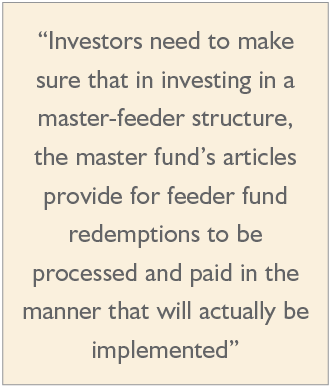 By Joanne Collett and James Gaden, Walkers
By Joanne Collett and James Gaden, Walkers
The recent case of Ardon Maroon Asia Master Fund (In Official Liquidation) serves as a stark reminder that it is critical that investment funds are built on properly considered, and expertly drafted constitutional documents, including the mechanics for redemptions.
The Ardon case
Ardon, represented by Walkers, is a Cayman Islands company serving as a “master fund” in a typical master-feeder structure. An investor in one of its feeders sent in a request to the Feeder fund to redeem its shares. The Feeder purported to automatically redeem its shares in the Master. However, the Feeder never served a redemption notice on the Master. Subsequently, both the Master and the Feeder (and another feeder) were placed into voluntary, and then court supervised, liquidation.
As part of the liquidation process, the Feeder submitted a proof of debt to the liquidators of the Master, which was adjudicated by the liquidators in the usual way, and, given the lack of compliance with the Master’s articles due to the lack of a redemption notice from the Feeder, was rejected by the liquidators. The Feeder appealed this adjudication. The importance of this decision, as described below, is that if the redemption notice was valid, then the US$15 million redemption amount would be paid to the Feeder as a creditor of the Master (to the detriment of the other feeder fund). If the redemption notice was not valid, then this creditor claim to the monies would not arise and the US$15 million would be shared between both feeder funds (as shareholders of the Master).
The main question for the Court was whether a notice from the Feeder to the Master was in fact required in order for the redemption to be valid.
The Court concluded that, notwithstanding significant evidence as to industry procedure, and arguments about how the offering memorandum of the fund should be interpreted, based on the articles of association of the Master, a notice of redemption was required from the Feeder to the Master before the redemption could be validly processed such that the proof of debt was rejected.
The decision is currently the subject of an appeal, which has not yet been heard.
 Is my existing fund affected and
Is my existing fund affected and
what can I do?
There are many master-feeder structures in the market where, like Ardon, the master fund is required to receive redemption notices from the feeder in order for feeder redemptions to be properly paid and the need for notice cannot be waived.
However, depending on the drafting of the offering memorandum, and possible issues caused by side letters, it should be possible to remedy any issues with the documents without disruption to business operations, or the need to bother ultimate investors. Critical will be how the articles of association have been drafted. These may need to be amended, but there are solutions.
I’m an investor — how do I know I can get my money out of the fund?
The ultimate victim in Ardon was the investor in the Feeder, which had thought that it had made a valid redemption from the Feeder that then would be paid first to the Feeder from the assets of the Master. Investors need to make sure that in investing in a master-feeder structure, the master fund’s articles provide for feeder fund redemptions to be processed and paid in the manner that will actually be implemented. For most investors, at the very least they should confirm that the offering document makes it clear that where a redemption request is made at the feeder level, the master fund will process a back-to-back redemption to ensure feeder redemptions are completed.
Conclusion
What may be most surprising to the industry about the Ardon decision was the vigour with which the Court chose to shun arguments regarding broadly adopted market practice and seemingly singularly look to the construction of the documents in making its decision. However, given the need for commercial certainty, the Court was left with little alternative given the arguments made. Even though an appeal has been filed, what should come as no shock is that the Court indicated that documents drafted in a manner tailored to the operation of funds is absolutely essential.
![]()
E: joanne.collett@walkersglobal.com
E: james.gaden@walkersglobal.com
T: (852) 2596 3354, (852) 2596 3433


